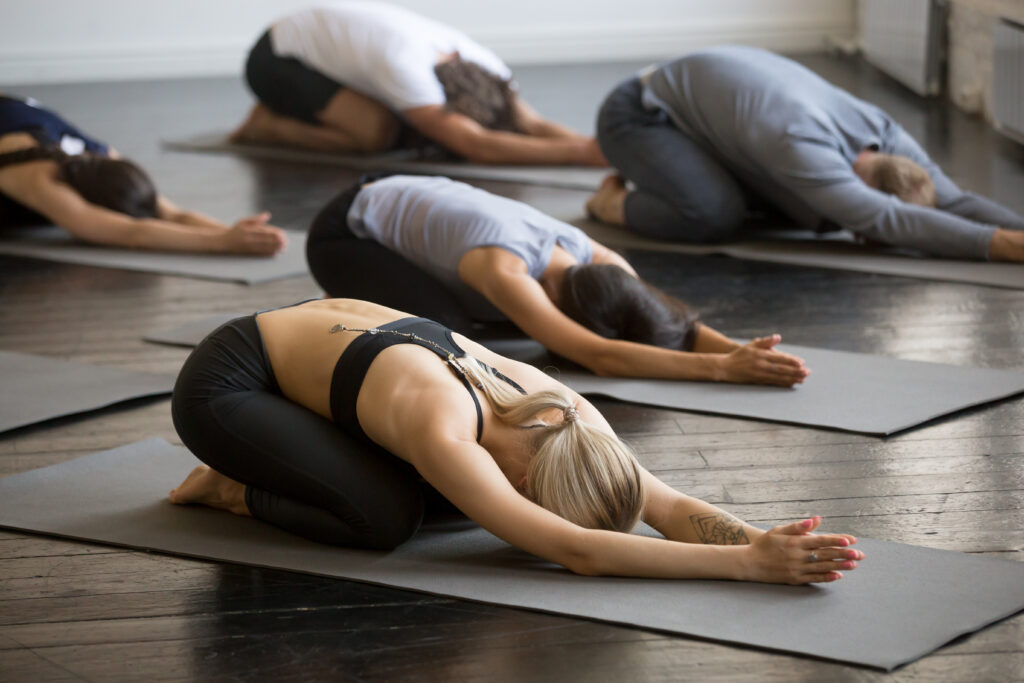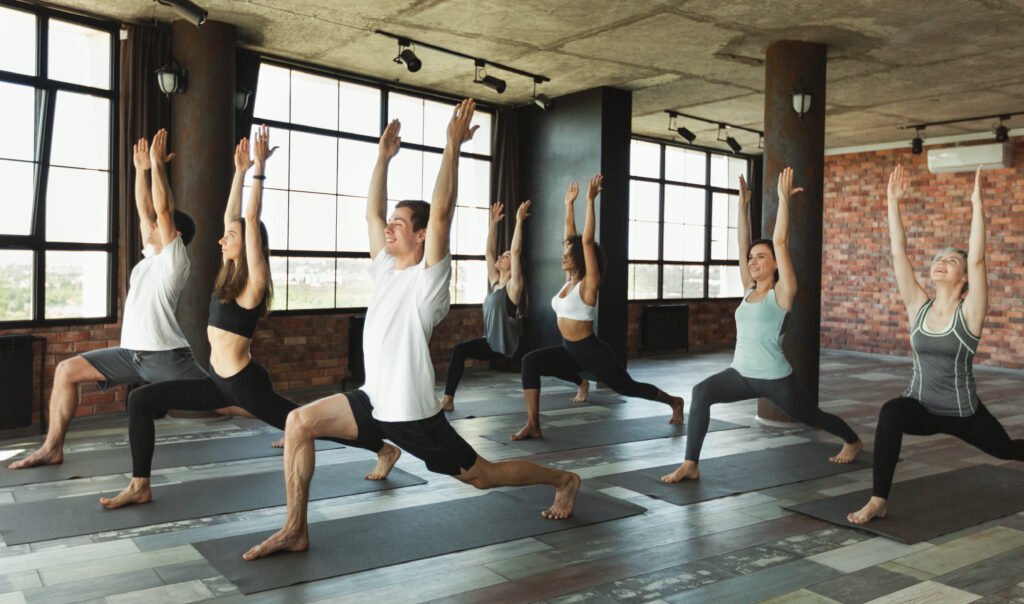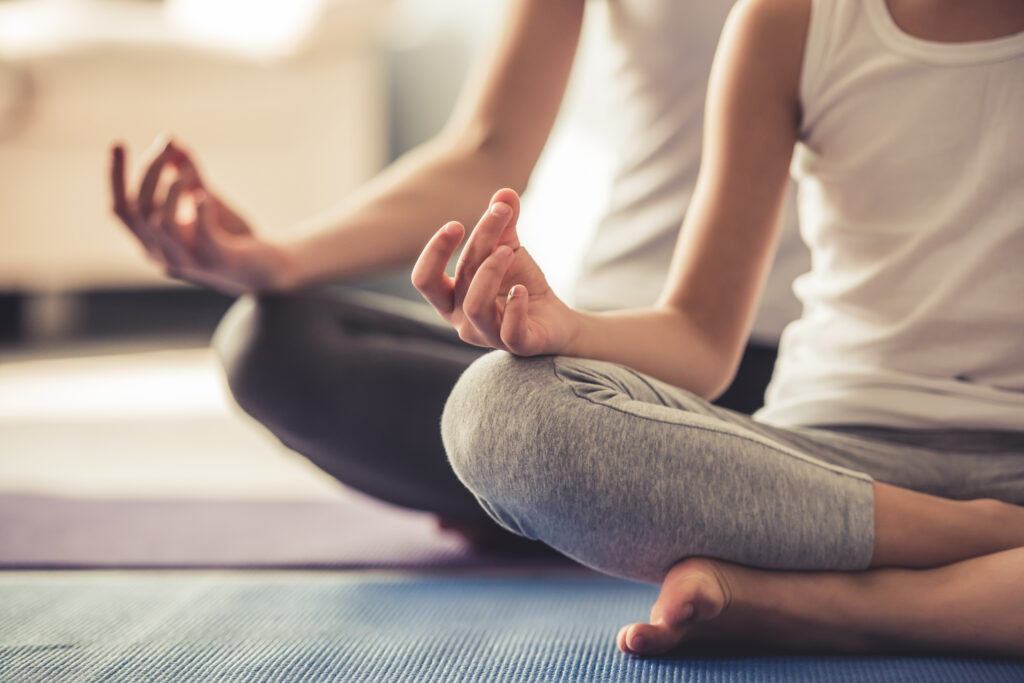Benefits of Yoga for Addiction Recovery and How to Get Started

The benefits of yoga for addiction recovery are numerous. Yoga is a body and mind training that combines controlled breathing, physical poses, and relaxation. It can help in lowering your cardiac rate, blood pressure, and it minimizes stress, among the many. Yoga started as a spiritual exercise but has been a popular method of promoting mental and physical health.
Related article: Can Yoga Help in Addiction Recovery?
The core elements of yoga are:
- Breathing: Managing your breathing is an integral component of yoga. It teaches you that controlling your breathing can aid to control your body and calm your mind.
- Postures: Yoga postures or poses are a set of movements intended to improve flexibility and strength. Poses range from positioning yourself on the floor while relaxed to more challenging postures that can stretch your physical limits.
- Relaxation: In yoga, you can combine relaxation. It can assist you in learning to become more aware and mindful of the present situation without judgment.
Effects of Yoga on Physical Health
The benefits of yoga for addiction recovery include improving your metabolism and maintaining a healthy weight. Having a well-balanced metabolism supports in controlling hunger and maintaining healthier body weight. Regular yoga practice helps attain the balance and promotes an effective metabolism. This process can help you to keep your weight in control.
The stretching of the muscles by performing yoga helps lessen cellulite. Also, yoga can assist in lowering cholesterol levels by improving blood circulation and burning fat by executing different yoga routines. Yoga stabilizes blood pressure, improves circulation, and strengthens the heart.
Continuously practicing yoga can lower your blood pressure levels through better oxygenation and circulation. It also lowers pulse rate, which indicates your heart is healthy enough to pump more blood throughout the body with fewer beats.
By bringing oxygen and nutrients throughout the body, yoga promotes more youthful skin, organs, and better brain function. A lower cardiac rate and enhanced oxygenation to the body provides higher cardiovascular strength and significantly lowers the risk of acquiring heart disease.
Effects of Yoga on the Organs
Yoga improves organ functions. Yoga helps in positively manipulating the internal organs, assisting the body to prevent illness. Seasoned yoga practitioners become fully accommodated to their bodies and recognize the initial signs of problems. It promotes a more immediate response to the onset of the disease process. Yoga also improves gastrointestinal functions, which aids in better digestion.
Yoga improves respiratory function and immunity. Having a standard respiratory rate of between 12 and 20 means the lungs are working more effectively. You can achieve this feat by performing yoga’s controlled breathing exercises and result in improved fitness. Through relaxation, our nervous system reduces the production of stress hormones, which indicates better immunity.

Yoga and Better Strength
Yoga improves strength, muscle tone, and endurance. You utilize your entire body weight for overall strength, and strong core supports the whole body weight, which in return helps in reducing possible injuries.
Yoga manages pain and promotes a better posture. We can manage acute and chronic pain and sometimes provide a remedy through performing yoga. Several people report back pain as their prime reason for attending yoga classes. Practicing yoga can help relieve muscle stress, reduce spinal compression, and improve overall body posture.
Through working the whole body, yoga enhances endurance, and that is why endurance athletes incorporate yoga in their training routines. Besides, the more you practice yoga, the more you will improve your muscle tone.
Better Sleep with Yoga
Another benefit of yoga for addiction recovery is that it helps you get better sleep so that you’ll have more energy. Constant yoga practise supports more steady energy levels. And because of the several perks to both mind and body that yoga gives, you will sleep a lot better. This effect is beneficial, particularly if you are having difficulty sleeping or suffering from insomnia.
Yoga also improves flexibility and increases joint movements. A proper and constant yoga practice can significantly improve the flexibility and movements of the joints in the body. This effect is the reason why yoga is ideal for people who are suffering from arthritis of the joints. Why? Because you can adapt almost all yoga postures while not overloading the affected joints, which are already painful.
Yoga also reduces the risk of injury. The moderate force you use while performing yoga, along with the controlled features of its motions, significantly lowers your risk of acquiring an injury. This benefit is way better if you compare it to the risks of acquiring injuries in other forms of exercise, which are more intense.
Yoga delays ageing and promotes balance. An essential component of yoga is stability and control over your body because yoga aims in improving our strength and overall balance. Amazingly, yoga also stimulates the process of detoxification in our body, which can delay ageing.
Effects of Yoga on Emotional Health
Among the great benefits of yoga for addiction recovery is it promotes self-control and self-acceptance. Focusing within, you will recognize that yoga does not aim for perfection, but self-acceptance. The controlled execution of yoga teaches you self-control which is applicable in your day to day living.
Yoga reduces anxiety and depression. One advantage of yoga’s managed breathing is reducing your anxiety. As you perform yoga, you usually suppress the negative feelings away from your mind.
Yoga promotes calmness. Focusing so keenly on what the body is doing draws calmness. Also, yoga introduces you to relaxation, helping you understand that proper breathing exercises and freeing yourself from your negative thoughts.
Withdrawal from drugs or alcohol can be tough. One of the benefits of yoga for addiction recovery is that it helps in reducing stress. Removing pressures out of the system, breathing control, de-stressing, and meditating helps in reducing stress significantly. The focus needed during yoga centers your attention on the present moment, which helps in diverting your attention away from your problems.
When this effect transpires, the negative energy no longer remains within you but is now released. Regularly clearing this negativity leads to a reduction of loneliness in several people. Yoga assists in converting negative mindset into a positive one.
Yoga is truly a mind and body practise because not only it promotes flexibility and strength, but it also helps in developing a peaceful state of mind. When you free yourself from mental tensions, you can reduce those mental stress which is harmful in your overall functioning. Remember that having a strong body and mind connection, and a healthy body along with a peaceful mind leads to happiness.

How to Get Started with Yoga Practice?
In this modern age, yoga is famous as a physical exercise that consists of body posture, breathing, movement, and meditation. Yoga helps a person not only in body and mind, but it also helps them spiritually. Yoga benefits can help a person manage their depression, stress, anxiety, quality of sleep, and improve their mood.
Yoga is not that difficult for the first-timer. For a beginner, you need to search what type of Yoga you will practice. Having an idea of what to expect for yoga practices is a big plus for a beginner. Most Yoga classes last for 45-90 minutes per session. It will start with a breathing exercise for a warm-up follow with body postures and movement and ending up with meditation.
Related article: Sober Activities to Enjoy in the Summer
Types of Yoga
There are many types of yoga that a person can practice. You must know the common types of yoga so you can choose the best option for you to practice. These are the typical types of yoga:
- Hot Yoga – from the term itself, you will practice yoga in a warm environment. It can reduce your body weight and fatigue if you practice this kind of yoga method. Not all people choose this method because some of them are sensitive to heat.
- Hatha Yoga – this is a slow-moving yoga practice, which is best recommended for a beginner.
- Vinyasa and Power Yoga – this is not suited for a beginner as this type of yoga has an intense method of practice. You can try this type of yoga when you have mastered some of the basic movements and postures.
- Kundalini Yoga – this can be comfortable for a beginner as it is composed of chanting, meditation, and spiritual practices.
- Iyengar – this type of Yoga practice uses props for proper alignment of body posture and movement.
Tips Before Starting Yoga Practice
Before you start practicing yoga, it is important that you read some information about it first. It is so that you can be prepared for it and that you’ll know what to expect. Here are some of the tips that you can take note of before you get started with yoga.
Learn To Use Breathing Technique
For people who want to practice yoga, they must learn how to breathe correctly. Breathing is one of the most important factors when you practice yoga. When doing body postures or movement, breathing helps you maintain your posture and balance.
Learn Brief Meditation
You need to learn proper meditation for a calm mind. This is not an easy task but by sitting and focusing on meditation, it is possible to control one’s mind. For a beginner, you may want to add a goal or prayer before meditating.
Proper Posture for a Beginner
There are many types of body postures and movements in yoga. Before starting with yoga postures, you can begin with warm-up stretching before doing the basic yoga pose. It will ensure that you won’t overwork your body and you won’t experience pain afterward.
Beginner’s Guide for Doing Yoga at Home
Some people prefer doing yoga at home. Because of their full schedule, they can hardly go to yoga classes. Yoga can be considered a workout for some people. They like doing Yoga better than going to the gym. If you want to practice yoga at home, here are some tips.
Create Space
When practicing yoga at home, you need to create space without compromising body movement and posture. It can be your living room or your bedroom as long as it has enough space for your yoga practice. You need to find the right type of yoga if you’re doing it at home. Start slow until you master the primary methods of yoga. Doing yoga will benefit your health as well as your spirit.
Set the Right Mood
It is essential in yoga to set your mood right. An unclear mind and bad mood when practicing yoga will contradict the essence of yoga. Meditation requires you to have a calm mind and have a sense of inner peace. The right environment can increase your mood drastically as it can help you to have a peaceful mind.

Right Posture
Yoga practice at home and in a class has a big difference in terms of method. When you’re at home, no one will guide you, unlike in the class. There is a teacher that will guide you step by step. Self-taught yoga is a challenge, especially when doing body posture and movement.
For yoga practice at home, you must learn the proper body posture or sequence. Creating your own pose or routine is hard when you’re a total beginner in yoga. The best strategy for practicing yoga at home is to attend a few classes to get an idea of the right process for doing yoga.
Learning the basics of Yoga through books and the internet is one of the methods to increase the knowledge on how to practice yoga. Asking help from a professional is the best option to get the proper posture and movement.
Setting Limits
Doing yoga for physical exercise is a good choice. Practicing yoga at home is the best option for your busy schedule. You need to know that setting limits for yoga practice are also essential. Knowing your body limit and when to stop is very important to avoid negative setbacks to your health.
If you have an injury like leg fracture or back pain, you need to avoid body posture and moving that might affect your injury. You can change your method by seeking guidance from a professional yoga instructor.
Resting your body is also part of Yoga practice. Knowing yourself and limits is the basic foundation of yoga. Beginners may want to speed things up. But it is not effective for Yoga and might affect your health negatively.
Takeaway
Yoga can be very challenging. don’t be embarrassed if you’re struggling with doing yoga. Take a break if you hit a dead end. Meditating and breathing can help you to calm your mind. Building confidence even slowly is still progress. And knowing your limits are very important.
Yoga is an exercise to improve body, mind, and health. The benefits of yoga for addiction recovery are plenty. It may take patience and effort to master the practice of yoga but it’s going to be worth it. You can choose to attend a class or do it at home. Yoga can be practiced by anyone as long as you understand the method and guidelines of yoga.
Call Inspire Change Addiction Rehab in Vancouver for addiction treatment programs.


